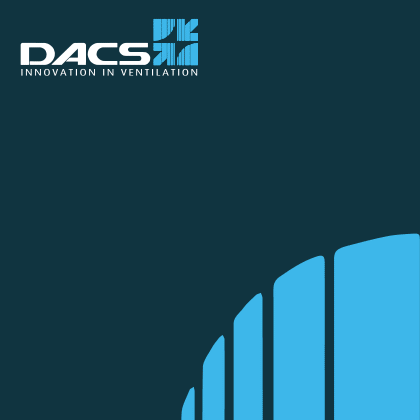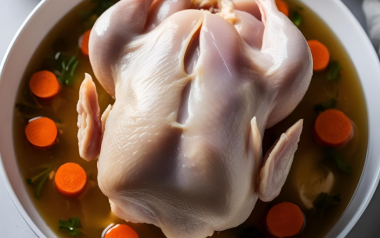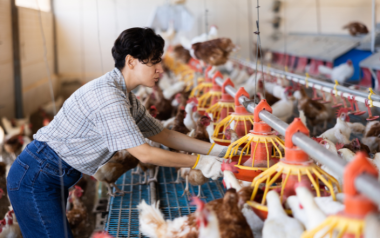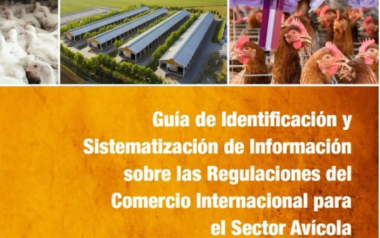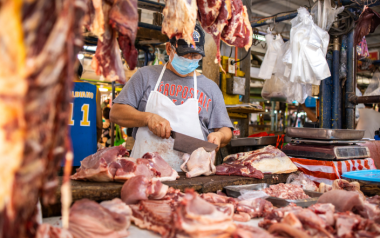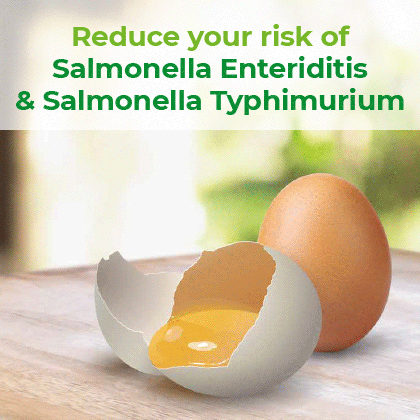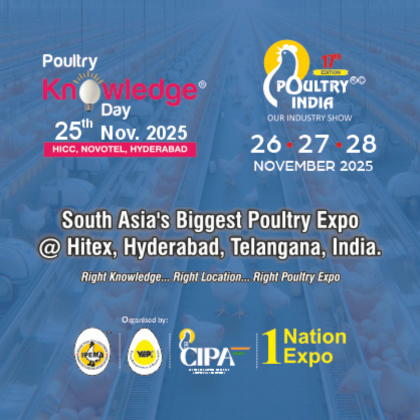1To arms citizens, form your battalions, 2Prepared by ODConsulting with data from FAOSTAT Food Balance Sheets (https://www.fao.org/faostat/es/#data/FBS), 3Butter, butter and still more butter, 4Executive Pork Summit 2024, 5I suggest reading my article “A Empresa Glocal” (The Glocal Company). Those who would like a copy please send me an email. I intend to review this article and translate it into Spanish and English.
11 Apr 2024
Hunt in pack and defend in pack
There are dozens of animal species that “hunt in packs”. There are several principles that guide hunting in a pack, but there is one king principle: all participating animals share the prey. Everyone eats the prey they helped hunt.
Many of you may have already seen one of those documentaries about wild animals, which I particularly enjoy and from which I learn a lot about hunting in packs in the corporate world and business life. There are dozens of animal species that “hunt in packs”. There are several principles that guide hunting in a pack, but there is one king principle: all participating animals share the prey. Everyone eats the prey they helped hunt.
Other important principles are that each member of the pack knows the role to play in the hunt, they stay focused on the objective until they reach it and above all that there is no place in the pack for a “prima donna.”
Dozens of species hunt in pack, including humans, but an estimated 85% to 90% of carnivores hunt individually. The advantages are obvious, the most important of which is allowing them to hunt larger and stronger prey in pack, which they would not be able to do individually.
Let us talk a little about humans. There are several examples of them hunting in pack and defending in pack, as long as they have a common denominator that unites them. It is the fan of a sports team, or the residents of a region or city or even a neighborhood. Another unifying factor is the danger that threatens a community, which leads to Marseillaise’s “aux armes cytoyens, formez vos Bataillons”1 as an extreme example.
Professional categories organize themselves into associations, colleges, unions, etc. with the aim of defending the rights of its members or to expand achievements.
There are people whose national characteristic is the prevalence of collective interest over personal interest, and I allow myself to cite Japan as the best example.
However, in my professional life I have noticed that in the animal protein segment there are few examples of those who practice this proven effective maxim. Our sector is among those that would need it most since we are a low margin segment and where 65% to 70% of the costs of raising an animal are beyond our control – grains.
Furthermore, we are the favorite target of food activists who hold us responsible for all planetary ills and the imminent destruction of the planet. And they do so with the zeal of new evangelists preaching with praise and praise the merits of a diet of vegetal products, fighting with the conviction of new crusaders any fact or data that contradicts their gospel.
To make the task of new evangelists easier, I present below a table in which I demonstrate the evolution of the average age and life expectancy at birth and data on the global average intake of kcal/capita/day in its grand total and divided between the intake of vegetal products plant and animal products. Ground zero on the table is the sixties, which saw the Green Revolution of Professor Norman Borlaug, Nobel Peace Prize winner in 1970. Nowadays, the new evangelists would certainly ask for him to be crucified.
The data in Table I show that the growth vector in global kcal/cap/day intake in the period from 1961 to 2020 was products of animal origin, with a growth of 50.9% and that life expectancy at birth world population increased in the same period by 51%.
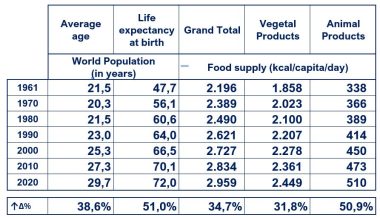
This has nothing to do with food, the new evangelists will shout (they rarely talk, because shouting is more effective). It is due to the progress of medicine and sanitary conditions in cities. As most of these new evangelists come from high-income countries, they naturally look at their backyard and believe that it represents the reality experienced in Latin America, Sub-Saharan Africa and Southeast Asia.
They will add that there are studies that show that vegetarians live longer than carnivores, omitting the part that the former are more likely to not smoke, not drink alcohol and exercise. Studies also claim that vegans live longer than vegetarians, but I contrast it with the observation of a friend when we discussed this topic during a barbecue with chicken wing drumstick, delicious pork pancetta and beef entrecôte, washed down with good wine: “Ok, but live longer for what?”
Note in Table II that the increase in proteins in the human diet is driven by products of animal origin. However, the amount of fat of vegetable origin is preponderant and the reason is that the first attacks on meat appeared in the sixties when vegetable oils began to replace lard, butter, coconut fat, palm oil and olive oil.
The accusation was that animal fats were responsible for everything from clogging arteries, increasing cholesterol to aggravated nails, with a slap on the consumption of eggs which they claimed were as dangerous as a hand grenade.
And the consequence of this crusade in defense of human health (at the time livestock farming did not yet threaten the planet) was the increase in the availability of vegetable oils and oilseeds, whose explosive increase can be seen in Table II.
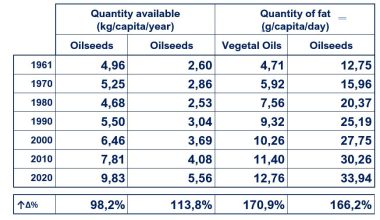
Science – oh the beautiful, noble and inconvenient science – returned animal fats to the status of edible without the risk of a heart attack two minutes after ingestion and allowed the French to continue stuffing themselves with wonderful cheeses (oh how I miss them) and spreading the word secret of French cuisine – du beurre, du beure et encore du beurre3. Inconvenient science demonstrated that the egg was one of the most nutritionally complete foods and recommends to international humanitarian organizations one egg a day for populations in regions affected by malnutrition.
But the crusaders raised a new flag – the defense of the planet against the threat posed by meat. And in modern times they no longer use horses, replaced by electric cars and bicycles, powered by energy produced with fossil fuels. And the huge elephant in the room, called fossil fuels, remains invisible to the eyes of activists and the press mesmerized by the piece of meat that will destroy the planet.
The inspiration for this article came from my presence at Cumbre Ejecutiva Porcina 20244, which reminded me of a European Union official who asked me who had helped Brazil become a power in the international poultry meat market, at the end of the nineties when it was still was at the forefront of exports. My answer was: you, because you imposed rules on European pig and poultry producers that only a country of continental dimensions and with a climate favorable to agriculture like Brazil could comply with.
When I visit Europe and people ask me what I do, I invariably say that I am in the arms trade, which provokes as a negative reaction, at most, “how horrible.” If I say that I made my life and career on animal proteins, I will hear a Catilinarian orations about how I contributed to contaminating the groundwater and how I threaten the planet with imminent destruction through meat.
The European livestock producer is seen and treated as a pariah to be relentlessly persecuted and it took a long time for them to react, since individual screams are rarely noticed and only the pack is effective in attacking and defending, not forgetting that in defense the pack places the weaker animals in the center and the strongest in the outer lines of protection of the pack.
I live and have built most of my career in Brazil, a country that has become an agribusiness exporting power, ranking first in exports of orange juice, coffee, sugar, soybeans, beef, poultry meat and cellulose, among others and one of the main exporters of pork, corn, cotton and fruits.
Alan Beattie of the Financial Times wrote: “Brazil is to agriculture what India is to business offshoring and China to manufacturing: a power whose size and efficiency few competitors can match.”
Brazil is one of the three largest agribusiness powers in the world, located in a country that does not count internationally. Its international prestige is low and consequently its bargaining power is almost non-existent, as reality shows that a country’s international power is linked to its power to retaliate.
So, how did they manage to achieve this position as an exporting power in agribusiness?
There is no single factor that explains this success, but I would be able to list some in the meat segment:
- Abundance of grains
- Territorial extension and land availability
- Favorable weather conditions
- Tradition of livestock farming
- Good science and technology on tropical agriculture
- Modern industry and fanatical entrepreneurs
- 3rd largest domestic meat market in the world
- Aggressive export competitiveness and hunting in packs on institutional issues
- The vertical integration system prevailing in the poultry segment
“Hunt in pack and defend in pack” is carried out by professionally managed associations, where members approve a budget and contribute to establishing goals to be pursued, but do not exercise executive functions.
I have already had the privilege of having been the Vice-President of two of these associations, ABEF (Brazilian Association of Chicken Exporters) and ABIPECS (Brazilian Association of the Pork Production and Export Industry). My merit? Absolutely not, but simply because I was the foreign market director of the second largest Brazilian exporting company.
Those were the days when there was no internet, no email, no cell phone, no WhatsApp and international calls had prohibitive costs. And believe me, the fastest communications were by telex. And when the fax machine appeared that allowed us to send shipping documents to customers, we thought we had reached Mount Olympus.
The sales method then was to take planes and visit markets and customers, return with orders and adjust their implementation with production and logistics. As we increased the number of importing countries and diversified products to achieve greater market coverage, the time available to address the association’s issues was minimal, not to mention that these positions required frequent contact with authorities and other associations.
The growing importance of associations in formalizing the opening of markets, adjusting the requirements of authorities in importing countries with local authorities and the entire range of topics necessary to represent the sector have led to the professionalization of the administration of our associations.
The first executive president of ABEF was the former CEO of the Brazilian branch of a huge European company, which in Brazil had factories in different segments and considerable exports. Naturally, among the associates there was a fear that a professional of this profile would cost a fortune, but in those days our poultry meat exports already reached US$4 billion annually and without professional support we would not be able to continue growing at the pace of the last decade.
The executive president was hired by a company in the beverage sector and in his place comes a professional who spent his life in agribusiness and whose leadership led him to occupy public positions, culminating in the position of Minister of Agriculture in one of the federal administrations. And he was invited to occupy the executive presidency of ABEF not because he had been a minister, but because of his record of achievements in the agricultural sector.
This new president conceived and promoted the merger of ABEF, ABIPECS and UBA (Brazilian Poultry Union) creating the current ABPA (Brazilian Association of Animal Proteins) and prepared his successor who today occupies the presidency of ABPA and who expanded it to include the segments of eggs, avian genetics and aquaculture. And in 2023 Brazilian poultry meat exports totaled US$ 9,8 billion.
All the successful segments I mentioned earlier among the world’s largest exporters have a common denominator – professionally managed associations.
There are a thousand and one reasons why member of a segment shouldn’t get together, from the simple “I don’t like him”, “you don’t know what they did to me” to the biggest of all, this non-voiced one: ego. But there is only one reason they should hunt in pack and defend themselves in pack: to survive.
And the companies that survive experience a series of side effects such as making money, expansion, internationalization and glocalization5.
And remember that the new evangelists are at our doors in their 21st century crusade – the end of meat consumption. They are hordes of well-intentioned idiots led by ill-intentioned people with their own agendas.
And remember that those who do not hunt or defend themselves in a pack will be hunted by those who hunt in pack. All you need to do is look at the level of concentration you had twenty years ago in the meat industry in your country and the level today. Surviving in the animal protein segment is increasingly the exception rather than the rule.
Surviving is not mandatory, but if you want to do this in a segment with low margins and high risks, there is a formula that proved its effectiveness and that gives the title to this article. Don’t forget that there is no free lunch and that to function well, a professionally managed association needs a budget compatible with its purposes and maintain a neutrality towards its members that would make the Swiss jealous.
This does not eliminate the fierce competition between association members. That is part of the rules of the game but defend yourselves in pack so that you can do what you do best – produce food for more people to eat. And there is a line of more than 3,000 million people, 42% of the world’s population, who cannot afford a healthy diet, which includes meat, eggs, milk and fish.
And these are often condemned to economic vegetarianism.





